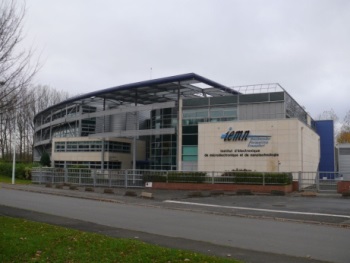Nanoscale Processing for NEMS and MEMS’ is the topic for the next Oxford Instruments technical workshop, being hosted in conjunction with the Institute of Electronics Micro-electronics and Nanotechnology (IEMN) in Lille, France on 8th April 2014.
This one day event aimed at scientists working in research and manufacturing with an interest in MEMS and NEMS, is designed to keep participants abreast of the latest technologies and trends in these hot industry research topics. Participants will be able to listen to a range of talks, including research results from guest speakers, process and application talks and advice, hints and tips from the experts at Oxford Instruments. There will be plenty of time for discussions, and to see process/technical posters.

Talks will include:
-
MEMS – how to make the macro-world smaller
-
Nanoscale etch
-
MEMS research applications and results - IEMN
-
Looking towards the next generation of MEMS devices – a leading research organisation
-
ALD for MEMS – Eindhoven University
-
ALD research and results – Guest speaker.
The prestigious Indian Institute of Technology (IIT) in Bombay hosted our most recent Workshop in December 2013, and Prof V.Ramgopal Rao, from IIT commented, “It was a pleasure for me to introduce the plenary sessions at IIT Bombay, and to give a talk on MEMS & Sensors for Healthcare & Homeland Security. Events such as this are an excellent opportunity not just for our researchers at IIT Bombay to learn about latest techniques but also for our colleagues outside this establishment to network and keep up to date with scientific advances”
Dr David Haynes, Sales and Marketing Director at Oxford Instruments said, “We organise an annual series of technical events worldwide, with extremely informative talks from a diverse range of speakers. They are a great means of finding out about new techniques and meeting colleagues facing the same challenges and opportunities in an informal setting.”
About Oxford Instruments plc
Oxford Instruments designs, supplies and supports high-technology tools and systems with a focus on research and industrial applications. It provides solutions needed to advance fundamental physics research and its transfer into commercial nanotechnology applications. Innovation has been the driving force behind Oxford Instruments' growth and success for over 50 years, and its strategy is to effect the successful commercialisation of these ideas by bringing them to market in a timely and customer-focused fashion.
The first technology business to be spun out from Oxford University over fifty years ago, Oxford Instruments is now a global company with over 1900 staff worldwide and is listed on the FTSE250 index of the London Stock Exchange (OXIG). Its objective is to be the leading provider of new generation tools and systems for the research and industrial sectors.
This involves the combination of core technologies in areas such as low temperature, high magnetic field and ultra high vacuum environments, Nuclear Magnetic Resonance, X-ray, electron and optical based metrology, and advanced growth, deposition and etching.
Oxford Instruments aims to pursue responsible development and deeper understanding of our world through science and technology. Its products, expertise, and ideas address global issues such as energy, environment, security and health.
About Oxford Instruments Plasma Technology
Oxford Instruments Plasma Technology offers flexible, configurable process tools and leading-edge processes for the precise, controllable and repeatable engineering of micro- and nano-structures. Our systems provide process solutions for the etching of nanometre sized features, nanolayer deposition and the controlled growth of nanostructures.
These solutions are based on core technologies in plasma-enhanced deposition and etch, ion-beam deposition and etch, atomic layer deposition, deep silicon etch and physical vapour deposition. Products range from compact stand-alone systems for R&D, through batch tools and up to clustered cassette-to-cassette platforms for high-throughput production processing.